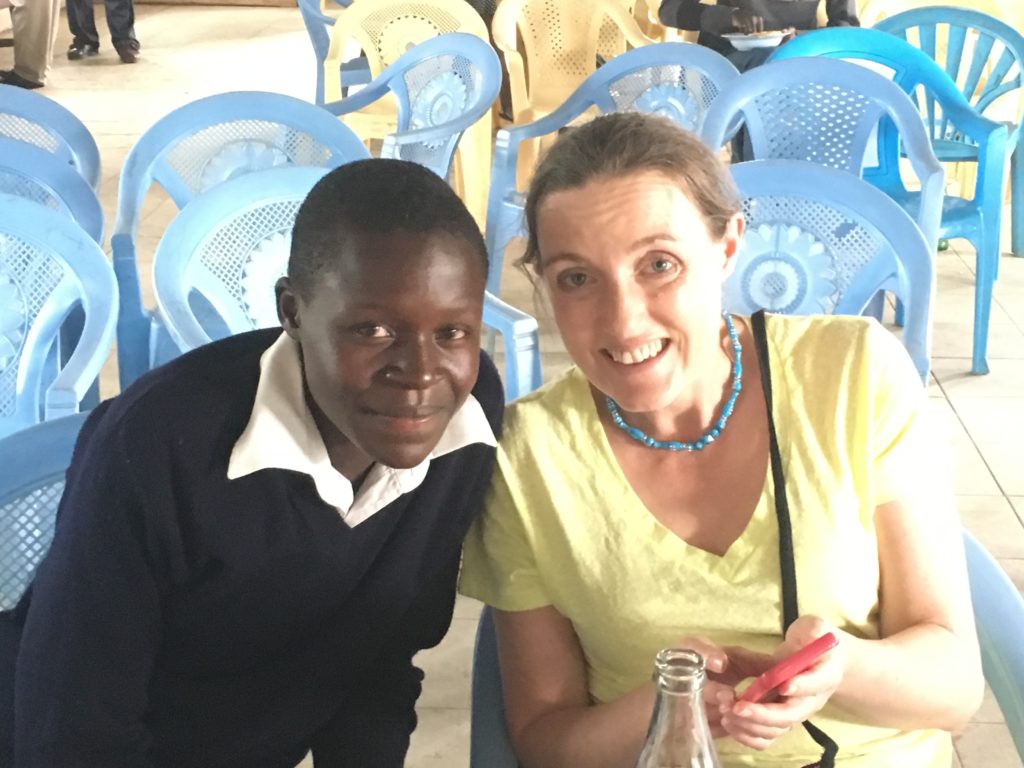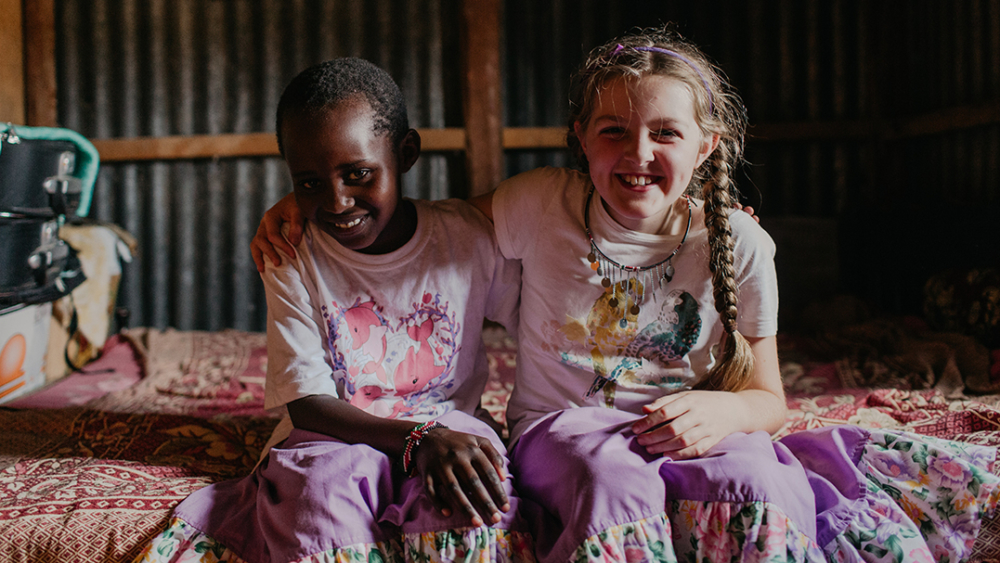The love of Christians for children in other countries might be a sufficient explanation for why the Compassion charity is doing well in Australia. But its successful strategy of forming strong partnerships with local churches has also been key – and makes it a good case study.
Getting pastors involved, and keen supporters is the “secret sauce” in the Compassion recipe.
“These children are from families who are not able to provide three meals each day.” – Dominic Steele
Spiro Cassis, a Sydney-based relationship manager at Compassion Australia, regularly takes pastors on trips to view Compassion projects in the field, to encourage them to partner at a church level.
“In Sydney, in the past eight years we’ve taken four groups of pastors to the field, and my colleague Paul Beaston took a group of pastors to Africa, and to a Christian enclave in Sulawesi in Indonesia,” says Cassis.
Paul and I took Colin Buchanan and a whole lot of other people to the Philippines.”
Cassis recently took Dominic Steele, senior minister of Village Church in Annandale, Sydney, along with 15 other pastors on a trip to a Compassion child sponsorship program in Jakarta.
In the Indonesian capital, Steele interviewed graduates Krisna Prasetyo – who came to Jesus through the program and is now an entrepreneur – and Liberty Astuti – a lecturer, school teacher and now working for Compassion in Indonesia.
“They spoke about growing up in extreme poverty, finding a safe community with Compassion and meeting Jesus,” says Steele.
“These children are from families who are not able to provide three meals each day. Through Compassion, they have been able to attend university. It was particularly exciting speaking with these young adults while meeting hundreds of children who are currently part of Compassion.”
Also on that trip were Sydney pastors Roger Fitzhardinge, from Fairy Meadow Anglican, and James Harricks, from Centennial Park, who spoke on Steele’s podcast The Pastor’s Heart about the impact the visit made on them.
“On the way over, part of my heart was cynical about how much difference programs like this could really make,” admits Fitzhardinge.
“I’ve been just astonished at the way that Compassion is, in Jesus’ name, bringing real change, to individuals, to families, to communities and the trajectory of people’s lives.”
According to Cassis, Compassion seeks only Christian sponsors because they will pray for a child by name and their family. “That’s why outcomes are great for Compassion kids because they’re actually being prayed for.”
Fitzhardinge also noted about Compassion that it does not “want corporate sponsors who just give stacks of money – although money is useful.” Instead, the Sydney pastor came to realise that this children’s charity grounds itself in “relationship and prayer”.
“What the goal of this program is, is to have kids who grow up, prayed for and relationally connected and written to, in ways that transform them,” Fitzhardinge explains.
As well as gaining an education, Liberty told Steele in Jakarta that she had also gained love and self-belief through the program: “As I grew in the project and the church, my mentors and pastors helped me to understand more about who Jesus is and why he loves me.
“We even find some evidence for spillover effects on the unsponsored younger siblings of sponsored children.” – Bruce Wydick
“Before that, I thought I was not worthy and felt rejected. After receiving Jesus, I felt that my point of view is changing so my self-image is restored.”
As a longtime child sponsor, Steele said he felt “soundly rebuked” that he had not been a good letter writer, after he saw the difference that kind of love made in the lives of the children he met.
“One of [my] resolutions … is to be a better letter writer, a better investor in their lives,” Steele says.
According to independent research of Compassion’s work in six countries, published in the Journal of Political Economy, sponsorship makes children 27 to 40 per cent more likely to complete secondary school, and 50 to 80 per cent more likely to complete a university education.
“We even find some evidence for spillover effects on the unsponsored younger siblings of sponsored children,” one of the researchers, Bruce Wydick, wrote in Christianity Today in 2013.
“Compassion’s results extend beyond school attendance. We found that child sponsorship means that when the child grows up, he is 14-18 per cent more likely to obtain a salaried job, and 35 per cent more likely to obtain a white-collar job. Many of the Compassion-sponsored children become teachers as adults instead of remaining jobless or working in menial agricultural labour. We found some evidence that they are more likely to grow up to be both community leaders and church leaders.”
A follow-up study with 1320 children in Bolivia, Kenya and Indonesia indicated that sponsored children had significantly higher expectations for their schooling than unsponsored children and generally had higher expectations for adult employment.
Such sociological results – and Compassion’s rigorous financial accountability – have impressed longtime child sponsor Justin Fitzgerald. His wife Fiona likes its commitment to empowering Bible-based, Jesus-focused local churches to deliver programs.

Fiona Fitzgerald, right, with Faith in the Nandi Hills in Kenya, close to where Fiona’s great-grandparents were missionaries
When Fiona married Justin, she told her new husband that one day she would like them to sponsor a child of the same age as each of the children they hoped to have.
Her impulse was that, through developing relationships with a child who lived in a different part of the world, her children would come to understand that God loves everybody, no matter where they live. She also hoped they learned that a child living in Australia has certain responsibilities, as well as a lot to learn from people born in different circumstances.
“That’s how the dream started,” says Fiona, who is the great-granddaughter of Stuart and Elise Bryson, early 20th-century Australian missionaries to Kenya, who translated the Bible into the Nandi language of East Africa.
“Then the dream grew a little bit more and I said, ‘it would be really cool to take them to visit their sponsored kids.’”
As we sit around the bench in their new kitchen – long delayed by the cost of making trips to Kenya – Fiona explains how, over the years, “God has woven the tapestry” that may eventually allow them to sponsor a child in Kapsabet, the community where her great-grandfather built a church.
“We’re inquiring about whether there’s a need for a Compassion project in Kapsabet … One day we’d like to close the loop.”
“One of the things that he observed straight away was the deep faith that the people in Kenya have.” – Fiona Bryson
Since 2010, Fiona and Justin have sponsored six children in Kenya through Compassion Australia. Justin has made four trips to Kenya, taking their eldest child, Ethan, to visit his sponsored brother, Kennedy, twice. Justin then took Riley to visit his brother Linus in 2015; and Sienna to visit her sister Praise in 2017. (That joyful meeting in a community called Olontoto – made after the pair exchanged countless letters – was filmed by Compassion.)
When Ethan went on his first trip to Kenya aged only 11½, the effect on him was profound.
“One of the things that he observed straight away was the deep faith that the people in Kenya have and the joy that they had despite their physical circumstances. And also that they leant on God in a way that we don’t here,” says Fiona.
After his second trip at age 15, Ethan experienced reverse culture shock; he grieved for the spiritual poverty of his school friends.
On a more positive personal note, Fiona is inspired by the family connection she has with Compassion’s work.
“The Kenya thing was exciting because of the link with Stuart and Elise Bryson,” says Fiona.
“I feel like the dream has grown; it has come to me from [God] over the years and he’s just grown it. Every part of it is a stretch, but our confidence also in the work of Compassion has grown over time.”
The Fitzgeralds chose to sponsor through Compassion because their church, St Paul’s Anglican in Castle Hill, set up a partnership with Compassion Australia and Nairobi Chapel nearly ten years ago.
Today, this church is Compassion Australia’s largest supporter. Members have sponsored 1500 children over the years with a 94 per cent retention rate. Currently, because some children have graduated, the total number of sponsored children is about 1000.


